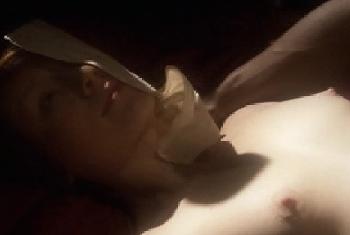CHAPTER ONE, in which the inevitable comparison is made
While “Manderlay” is indeed the S to the U that was Dogville in Lars von Trier’s United States of America Trilogy and while it does share some of the same protagonists, themes and aesthetic devices as its predecessor, it is a different film. For starters, Grace is not played by the same actress, and her role in this new tale is reversed. Whereas she was victimized through almost all of her stay in Dogville, she holds a position of power in Manderlay. Still, some will insist to know how the two films compare, so let’s address that right away. Yes, “Dogville” was better. No, Bryce Dallas Howard isn’t the goddess Nicole Kidman is. Moving on!
CHAPTER TWO, in which the background of Manderlay is established
The Manderlay the title refers to is a cotton plantation in Alabama where Negroes are still submitted to forced labor, even though slavery was abolished 70 years prior. When Grace (Howard), her father (Willem Dafoe, taking over for James Caan) and his gangsters drive by the place, the young woman, whose idealism has apparently grown back since the events of the previous picture annihilated it, decides to get involved. She confronts slave master Mam (Lauren Bacall) and her family and before long, she finds herself in charge of the community. While she sincerely wishes to eradicate the evil legacy of “Mam’s Law” and help the Negroes learn to run the plantation for themselves, it soon becomes obvious that it’s more difficult to free a man’s mind than his body.
CHAPTER THREE, in which controversial issues are explored
Like “Dogville”, this is a movie where it’s better not to know too much about it beforehand, so I’ll tread carefully. What von Trier is after here is shedding light on the dark history of post-slavery America, a subject all too relevant even today, as these old scars still haven’t healed. The Danish filmmaker also evokes that old saying about how power corrupts, even if you give power to the people. Grace sets up meetings, then lessons on democracy and the slaves-turned-shareholders are soon voting about problems and potential solutions… But what if the decisions they reach don’t fit Grace’s sense of what’s right? As Homer Simpson once memorably said, “Democracy just doesn’t work!”
More seriously, “Manderlay” is a giant kick in the balls of the US, in which African-Americans are still often ghettoized or oppressed and where the unwise idea of implanting democracy by force is still alive and well coughIraqcough
CHAPTER FOUR, in which Lars lets his kinks fly
Here’s a film with a subject begging to be taken deadly serious, but that would be underestimating von Trier’s wicked sense of humor. He’s obviously getting off on pissing the hell out of people, but I guess I’m twisted enough to laugh along with him. From the seemingly irrelevant macho remarks that Dafoe’s character makes at the beginning of the film to Dr. Hector’s third act revelations, “Manderlay” could be taken as a 139 minute dick joke, with Grace feeling “heat in her loins” for a Munsi, i.e. an African of royal descent… But this is “more bizarre than erotic”, and I don’t feel this undermines the picture. Your mileage may vary, natch.
CHAPTER FIVE, in which Dogville is brought up again. Drats.
I’m having trouble understanding those who not only think “Manderlay” lesser than “Dogville” (it is, then again, what isn’t?) but actively dislike it. It makes similarly brilliant use of minimalist set design, chapter titles and storybook narration by John Hurt, it’s epic in length but remarkably devoid of filler and it’s endlessly thought-provoking and emotionally affecting, all the way to the end of the end credits, again showing a photomontage set to David Bowie’s Young Americans. Where the movie kind of is less involving indeed is in the supporting cast, not because the Black actors aren’t capable but because they’re mostly playing one-dimensional stereotypes. This sounds like a huge minus, but it’s totally justified by the story, which implies that the slaves were made to fit in neat little boxes (“proudy nigger”, “pleasin’ nigger”, etc.). And sure, the Kidman is missed, but I actually find Bryce Dallas Howard quite extraordinary in her own way, and if von Trier ends up using a different actress in each of his USA – Land of Opportunities episodes, that might work in making them more universal. Or not. In any case, “Manderlay” is indeed one of the best films of the year, and I eagerly await the final installment, “Wasington”.

